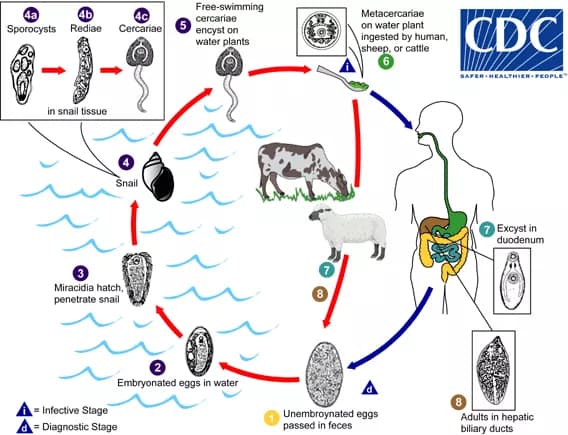What are the other Names for this Condition? (Also known as/Synonyms)
- Fasciolosis
- Infection by Fasciola, NOS
- Liver-Rot Disease in Humans
What is Fascioliasis? (Definition/Background Information)
- Fascioliasis is an infestation by a parasitic worm, the liver fluke, which targets the liver. It occurs due to eating raw or uncooked goat, lamb, or certain water plants that are contaminated. The infection is also known as Liver Fluke Disease
- Fascioliasis is caused by ingestion of parasitic worms (of the genus Fasciola), whose eggs are found on certain water plants, such as watercress, algae, etc., around the world
- The symptoms of Fascioliasis occur in 3 phases of acute, latent, and chronic. This may include fever, gastrointestinal difficulties, abdominal pain, and jaundice
- A diagnosis for Fascioliasis may be arrived at by examining the signs and symptoms, medical (travel) history, and by testing for liver fluke eggs in the feces
- Complications include the development of Halzoun syndrome (a form of throat infection), if specific types of these parasitic worms are ingested, and chronic liver disease that can be even fatal
- The treatment of Fascioliasis is through appropriate medication. With adequate treatment, the prognosis is generally excellent as a complete cure can be achieved
Who gets Fascioliasis? (Age and Sex Distribution)
- Fascioliasis can affect individuals of all ages; both children and adults
- Both males and females can be affected and no gender preference is noted
- All races and ethnic groups can be affected by Fascioliasis, though it is most common in certain countries including Ecuador, Peru, Bolivia, Chile, Iran, and Egypt
What are the Risk Factors for Fascioliasis? (Predisposing Factors)
The risk factors for Fascioliasis may include:
- Eating raw or undercooked goat or lamb (plant-eating animals that may have consumed water plants containing liver fluke bacteria)
- Eating certain freshwater plants which may contain liver fluke bacteria
It is important to note that having a risk factor does not mean that one will get the condition. A risk factor increases one’s chances of getting a condition compared to an individual without the risk factors. Some risk factors are more important than others.
Also, not having a risk factor does not mean that an individual will not get the condition. It is always important to discuss the effect of risk factors with your healthcare provider.
What are the Causes of Fascioliasis? (Etiology)
- Fascioliasis is caused by parasitic worms belonging to the genus Fasciola that are found on certain water plants (watercress, algae, etc.) around the world
- The pathogens that are involved include Fasciola hepatica (sheep liver fluke or common liver fluke) and Fasciola gigantica (the largest liver fluke known to infect humans)
- The accidental ingestion of eggs occur by eating contaminated food, such as by consumption of raw water cress and undercooked sheep/lamb
What are the Signs and Symptoms of Fascioliasis?
The symptoms of Fascioliasis occur in 3 phases and these are classified as acute, latent, and chronic.
- Signs and symptoms of the acute phase; it may develop from 4 days after infection to about 3 months:
- Fever
- Abdominal pain
- Tenderness in the liver
- Gastrointestinal problems
- Hives
- Bronchial asthma
- Latent phase, when the liver flukes reach the bile duct; this can last several months. During this phase, the individuals may be asymptomatic (not showing any symptoms)
- Signs and symptoms of the chronic phase (several years)
- Gastrointestinal pain
- Intolerance to fatty foods
- Nausea
- Jaundice
- Itching
- Abdominal tenderness
How is Fascioliasis Diagnosed?
A diagnosis of Fascioliasis may be made by the following observations and tests:
- A careful physical examination and assessment of one’s medical (and travel) history: The individual often may report having traveled to a region known to have liver flukes and consumed aquatic plants (such as watercress and algae) or undercooked goat or lamb
- Blood test: Individuals with infection will show a positive antibody against the parasite
- Stool test: Liver fluke eggs may be found in the excrement of individuals who are in the chronic phase
What are the possible Complications of Fascioliasis?
The possible complications of Fascioliasis include:
- Chronic gastrointestinal discomfort
- Development of Halzoun syndrome (or infection targeting the throat), if certain specific types of parasitic worms are ingested
- Chronic liver disease resulting in jaundice; untreated liver failure can be fatal in the long-term
How is Fascioliasis Treated?
The treatment of Fascioliasis is through medications that are administered in a single or double dose, about 12 hours apart. The medication can help kill both the immature and adult parasitic worms.
How can Fascioliasis be Prevented?
Fascioliasis may be prevented by the following measures:
- Cooking lamb and goat meat thoroughly before consumption
- Inspection of animals in areas where Fasciola parasite affecting water plants is recognized or identified
- Providing education and spreading awareness of the infection in regions, where contaminated water plants are consumed
What is the Prognosis of Fascioliasis? (Outcomes/Resolutions)
- The prognosis for Fascioliasis is generally very good and cure rates are high
- Individuals, who are not cured of the illness after one dose of medication may be asked to take another dose by the healthcare provider
- While adverse reaction (side effects) to the medication may occur, they are generally reported to be temporary and mild
Additional and Relevant Useful Information for Fascioliasis:
Only specific types of the parasitic worm can cause Halzoun Syndrome; these parasites are also found on the same water plants.
Related Articles
Test Your Knowledge
Asked by users
Related Centers
Related Specialties
Related Physicians
Related Procedures
Related Resources
Join DoveHubs
and connect with fellow professionals


0 Comments
Please log in to post a comment.